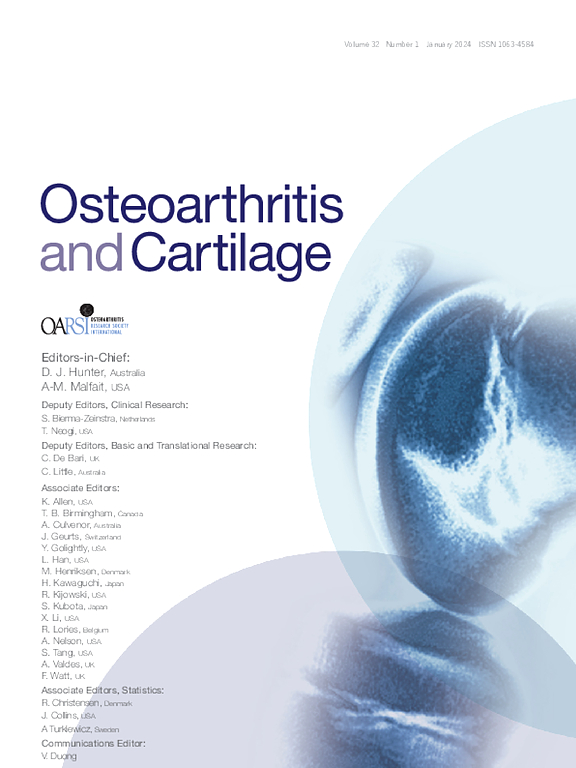Emapunil relieves osteoarthritis by regulating the CD14/TLR4/LY96 pathway in synovial macrophages through translocator protein 18 kDa.
IF 7.2
2区 医学
Q1 ORTHOPEDICS
引用次数: 0
Abstract
OBJECTIVE Osteoarthritis (OA), the most prevalent chronic degenerative joint disease, lacks effective therapies due to unclear pathogenesis. This study investigated the effects and mechanisms of translocator protein 18 kDa (TSPO) and its ligand emapunil in OA. METHODS TSPO expression was assessed in synovium, macrophages, and cartilage from OA mice and patients. Macrophages TSPO was manipulated via plasmid and siRNA to evaluate polarization and inflammatory responses. Molecular docking was applied to evaluate TSPO affinity was validated by molecular docking, and its therapeutic effects were tested in vitro and in vivo. RNA sequencing analyzed LPS-induced M1 macrophages treated with Emapunil. RESULTS TSPO was upregulated in OA synovium (particularly macrophages) but unchanged in cartilage. Overexpression promoted M1 polarization and proinflammatory cytokine release, while TSPO inhibition showed no significant effects. Emapunil, a potent TSPO ligand, suppressed LPS-induced M1 polarization, reduced proinflammatory cytokines, and alleviated chondrocyte destruction. Intraperitoneal Emapunil attenuated synovitis and cartilage erosion in OA mice, lowering synovitis and Osteoarthritis Research Society International scores (OARSI), reducing M1 macrophages and MMP13, while increasing COL2. Mechanistically, Emapunil downregulated CD14/LY96 mRNA via TSPO, inhibiting NF-κB/TLR signaling and M1 polarization. TSPO inhibition abolished Emapunil' s regulatory effects on CD14/TLR4/LY96 pathways. CONCLUSION TSPO plays an important role in OA occurrence and development. Emapunil targeting TSPO improves OA by modulating macrophage polarization and inflammation through the CD14/TLR4/LY96 pathway.Emapunil通过转运蛋白18kda调节滑膜巨噬细胞CD14/TLR4/LY96通路,缓解骨关节炎。
目的骨关节炎(OA)是最常见的慢性退行性关节疾病,由于其发病机制尚不清楚,缺乏有效的治疗方法。本研究探讨了转运蛋白18kda (TSPO)及其配体emapunil在OA中的作用及其机制。方法检测骨性关节炎小鼠和患者滑膜、巨噬细胞和软骨中stspo的表达。通过质粒和siRNA操纵巨噬细胞TSPO来评估极化和炎症反应。采用分子对接方法评价TSPO亲和性,通过分子对接验证其有效性,并在体外和体内测试其治疗效果。RNA测序分析Emapunil处理lps诱导的M1巨噬细胞。结果骨性关节炎滑膜(尤其是巨噬细胞)中stspo表达上调,而软骨中表达不变。过表达促进了M1极化和促炎细胞因子的释放,而抑制TSPO无明显作用。Emapunil是一种有效的TSPO配体,可抑制lps诱导的M1极化,减少促炎细胞因子,减轻软骨细胞破坏。腹腔注射Emapunil可减轻OA小鼠滑膜炎和软骨糜烂,降低滑膜炎和骨关节炎国际研究学会评分(OARSI),减少M1巨噬细胞和MMP13,同时增加COL2。机制上,Emapunil通过TSPO下调CD14/LY96 mRNA,抑制NF-κB/TLR信号和M1极化。TSPO抑制消除了Emapunil对CD14/TLR4/LY96通路的调节作用。结论tspo在OA的发生发展中起重要作用。Emapunil靶向TSPO通过CD14/TLR4/LY96通路调节巨噬细胞极化和炎症,改善OA。
本文章由计算机程序翻译,如有差异,请以英文原文为准。
求助全文
约1分钟内获得全文
求助全文
来源期刊

Osteoarthritis and Cartilage
医学-风湿病学
CiteScore
11.70
自引率
7.10%
发文量
802
审稿时长
52 days
期刊介绍:
Osteoarthritis and Cartilage is the official journal of the Osteoarthritis Research Society International.
It is an international, multidisciplinary journal that disseminates information for the many kinds of specialists and practitioners concerned with osteoarthritis.
 求助内容:
求助内容: 应助结果提醒方式:
应助结果提醒方式:


